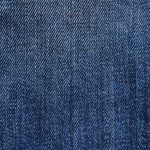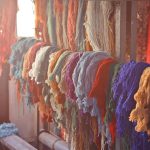When you're considering comfort in clothing, you might wonder how ring spun cotton stacks up against jersey knit. While both fabrics have their merits, ring spun cotton is often praised for its decadent softness and breathable qualities, making it a popular choice for those seeking a gentle touch on their skin. On the other hand, jersey knit offers a cozy stretch that many find appealing. However, as you evaluate your options, you might realize that the differences in breathability and temperature regulation could significantly impact your comfort throughout the day. What's your priority in fabric choice?
Table of Contents
Overview of Ring Spun Cotton
Ring spun cotton is a type of fabric known for its softness and durability, made by twisting and thinning the strands of cotton to create a finer yarn. This process not only enhances the texture but also strengthens the fabric, resulting in a product that's both comfortable and long-lasting.
You'll appreciate the feel of ring spun cotton against your skin—it's ideal for casual wear, loungewear, or anything that requires a bit of comfort. When you choose garments made from ring spun cotton, you're opting for a fabric that resists pilling, maintaining its appearance over time.
The breathable nature of this cotton allows for air circulation, keeping you cool on warmer days. It's also versatile; you can find it in t-shirts, hoodies, and even in various blends.
In addition, ring spun cotton absorbs moisture efficiently, making it suitable for active use. If you're looking for clothing that provides both comfort and functionality, ring spun cotton should be at the top of your list.
Its combination of softness and durability creates a fabric experience that's hard to beat.
Characteristics of Jersey Knit
Jersey knit is a versatile fabric known for its stretch, breathability, and smooth texture, making it a popular choice for various clothing items.
When you consider jersey knit, you'll appreciate several key characteristics that enhance its appeal:
- Elasticity: Jersey knit stretches easily, allowing it to fit snugly against your body without feeling restrictive. This elasticity is perfect for activewear and casual clothing.
- Breathability: The open weave of jersey knit promotes airflow, keeping you cool and comfortable, especially during warmer weather.
- Lightweight: Weighing less than some other fabrics, jersey knit is ideal for layering, making it suitable for all seasons.
- Versatile Uses: You can find jersey knit in t-shirts, dresses, and athletic wear, proving its adaptability in fashion.
These characteristics combine to create a fabric that not only feels great but also performs well in various settings.
Whether you're lounging at home, hitting the gym, or stepping out for an errand, jersey knit provides the comfort and ease you need.
Embracing this fabric means choosing style without sacrificing comfort.
Softness and Texture Comparison
When comparing softness and texture, you'll find that ring spun cotton offers a luxe feel that often outshines standard jersey knit fabrics.
Ring spun cotton is crafted through a spinning process that pulls and twists the fibers, resulting in a smoother and finer texture. You can immediately feel the difference when you touch it; it's silky and gentle against your skin.
On the other hand, jersey knit tends to have a more relaxed texture. While it can still be soft, the fabric may not have that same premium softness that you experience with ring spun cotton. Jersey knit often has a thicker, heavier feel that some find cozy, but it can be less forgiving when it comes to gentle touch.
In your search for comfort, consider how these textures play a role in your overall experience. If you prefer something that's luxurious and feels great to wear all day, ring spun cotton may be the ideal choice for you.
However, if a casual and relaxed fabric fits your style better, then jersey knit could still be a suitable option. Ultimately, it boils down to what feels best on you.
Breathability and Moisture-Wicking
Breathability and moisture-wicking properties are crucial factors that can significantly enhance your comfort in different fabrics. When you're deciding between ring spun cotton and jersey knit, understanding how these materials perform in this area is key to your comfort level.
- Ring Spun Cotton: This fabric offers a soft, breathable quality that allows air to circulate well. Its moisture-wicking capability keeps sweat at bay, offering you a drier feel throughout the day.
- Jersey Knit: While jersey knit provides good breathability, it tends to trap more heat compared to ring spun cotton. Its moisture-wicking properties are decent but less effective under high-sweat conditions.
- Use Cases: If you're working out or spending a lot of time outdoors, ring spun cotton is often a better choice. You'll probably find it more comfortable for active wear or hot climates.
- Comfort Factor: Ultimately, understanding how each fabric handles breathability and moisture can help you make informed choices in your wardrobe, enhancing your overall comfort and experience.
Durability and Longevity
Durability and longevity are essential considerations, especially if you want your clothing to withstand regular wear and maintain its appearance over time. When comparing ring spun cotton and jersey knit fabrics, you'll find notable differences in their durability.
Ring spun cotton is known for its strong, twisted fibers that create a smoother and more resilient fabric. This construction method enhances its durability, so you won't have to worry as much about wear and tear. When you choose ring spun cotton, you're investing in a fabric that's less likely to pill and maintain its structure after multiple washes.
On the other hand, jersey knit can be more prone to stretching and losing shape over time, especially if it's made from lower quality yarns. While it can feel soft and comfortable against your skin, it doesn't always hold up as well through extensive laundering.
Choosing the Right Fabric for You
When you're choosing a fabric, consider how breathable and soft it feels against your skin.
You'll also want to compare the stretch and durability of each option to find what suits your lifestyle.
Understanding these factors helps you make the best choice for comfort and longevity.
Fabric Breathability and Softness
Choosing the right fabric can significantly impact your comfort, especially when it comes to how breathable and soft the material feels against your skin. You'll want to consider a few key factors to make sure you choose the best option for your needs.
- Breathability: Ring spun cotton tends to offer better breathability than jersey knit, allowing air to flow and keeping you cool.
- Softness: The twisted fibers in ring spun cotton create a softer surface, which can feel gentler against your skin compared to jersey knit.
- Moisture-wicking: Cotton is naturally moisture-wicking, which means it can help absorb sweat and keep you dry, enhancing your overall comfort.
- Skin Sensitivity: If you have sensitive skin, opt for ring spun cotton, as it's less likely to cause irritation due to its smoother texture.
Stretch and Durability Comparison
Understanding how ring spun cotton and jersey knit compare in stretch and durability can help you make an informed decision for your wardrobe.
When it comes to stretch, jersey knit fabric tends to offer a greater amount due to its knit structure. This elasticity allows the fabric to move with you, making it ideal for activewear or comfortable everyday styles. Ring spun cotton, while softer and smoother, lacks the same level of stretch because it's typically woven rather than knitted.
In terms of durability, both fabrics have their strengths. Jersey knit is known for its ability to withstand wear and tear, mainly because of its flexible weave. However, ring spun cotton boasts greater overall longevity due to its fine, strong fibers. It often holds its shape better over time, resisting stretching and sagging in areas that see a lot of movement.
Ultimately, your choice might depend on your lifestyle. If you prioritize comfort and flexibility, jersey knit is a solid option. On the other hand, if you want something soft yet durable, ring spun cotton may be your best bet.
Choosing wisely can lead to a wardrobe that meets your needs and feels great.
Frequently Asked Questions
Can Ring Spun Cotton Shrink More Than Jersey Knit Fabrics?
Yes, ring spun cotton can shrink more than jersey knit fabrics. Its tighter construction often reacts more dramatically to washing and drying, so you might want to take care when cleaning items made from it.
Is Jersey Knit Fabric Stretchy Compared to Ring Spun Cotton?
Yes, jersey knit fabric's got a notable stretch compared to ring spun cotton. Its knit structure allows for flexibility, making it a popular choice for comfortable, fitted clothing that moves with you throughout the day.
How Do Washing Instructions Differ for Each Fabric Type?
When washing ring spun cotton, use cold water and gentle cycles to preserve softness. For jersey knit, you can often wash warm but should avoid bleach. Always check labels for the best care tips.
Are There Any Specific Skin Sensitivities to Consider for These Fabrics?
If you have sensitive skin, you should consider the fabric's processing. Ring spun cotton's usually gentler, while certain jersey knits might contain synthetic blends that could irritate. Always check labels for potential allergens to stay safe.
Can Ring Spun Cotton and Jersey Knit Be Blended With Other Materials?
Yes, you can blend ring spun cotton and jersey knit with other materials. Combining them with synthetics or blends like spandex enhances stretch and durability, giving you versatile fabrics suitable for various clothing styles and uses.
- How Does Ring Spun Cotton Affect Garment Fit and Shape Retention? - August 13, 2024
- What Are the Challenges in Producing Ring Spun Cotton? - August 13, 2024
- Is Ring Spun Cotton Suitable for Plus-Size Clothing? - August 13, 2024







